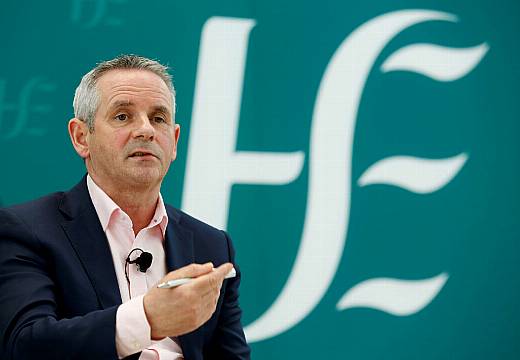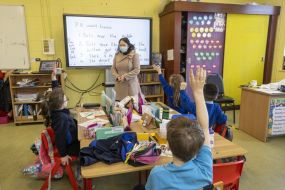Updated at 10:12
The HSE’s director general Paul Reid has defended the decision to allow children who are close contacts to attend school if they are asymptomatic.
There were lower levels of transmission of the virus in schools, he told Newstalk Breakfast which meant that “on the balance of risk” it was safer for children to be at school.
The level of transmission in schools was only five percent while it was 25 percent in households, he added. Having significant numbers of children out of school was a much higher risk for their wellbeing.
Mr Reid also explained that the HSE was now planning for a transition phase in its treatment of Covid.
The focus would now be on planning for a transition phase, how to move from pandemic to endemic. How to monitor and assess symptoms, maintain surveillance of outbreaks. Part of the transition would also include treatment of Long Covid, he added.
Restricting movements
It comes as The Irish Times reports, the HSE's, Dr Colm Henry, said primary school children no longer having to restrict movements or be tested if they are close contacts of a Covid case was a “big change” and a “significant signal” but it “doesn’t represent an undoing of some core public health protections”.
He added that it was “very reassuring” to see the positivity rate decrease from 16 per cent to 5 per cent despite a significant increase in the numbers of children being tested in recent weeks.
Meanwhile, teachers’ groups expressed concern the change – coming into effect on Monday – would confuse parents where children aged 12 and younger would still be required to restrict their movements, and be contact-traced and tested, if they were close contacts through a household rather than through a school.
There are fears that the relaxation of the measures for unvaccinated children will lead to families taking a more relaxed approach to the virus generally and result in more cases in schools.
“We are worried that parents will think that this is a sign that we can drop our guard,” said John Boyle, general secretary of the Irish National Teachers’ Organisation.
Pace of changes
Teachers were worried about the pace of the changes, given the high numbers of cases among schoolchildren, when waiting until the midterm break next month might have been more prudent, he said.
Mr Boyle said that the Departments of Health and Education had “abjectly failed” to communicate the changes clearly to families of 600,000 primary schoolchildren.
Brian O’Doherty, president of the Irish Primary Principals’ Network, said school principals were anxious that the relaxation of measures was premature given the high number of cases.
He called for a “renewed focus” on informing parents of the importance of keeping children who were showing Covid symptoms at home and consistency in the public messages around what symptoms to watch for.
Christine Loscher, a professor of immunology at Dublin City University, said that removing “fundamental tools” such as contact-tracing and testing for the only unvaccinated group in the country too early was “a bad idea”.
“Without contact-tracing and testing, we are actually not going to even know whether the numbers of asymptomatic children are increasing,” she said.
Additional reporting by Vivienne Clarke







